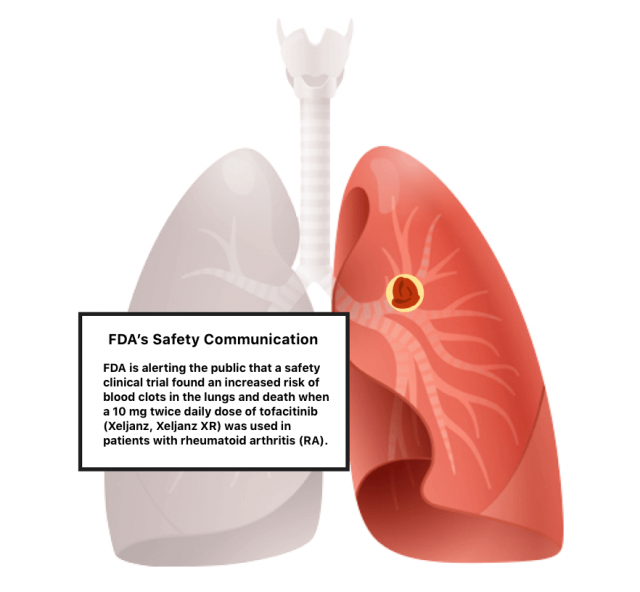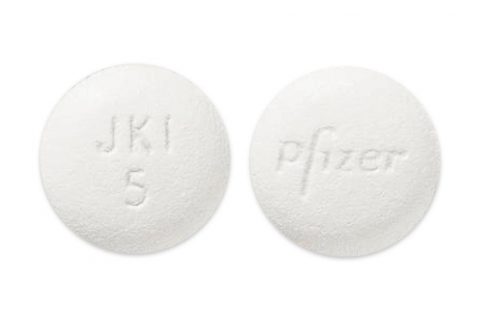Xeljanz Side Effects
The most common side effects of Xeljanz include upper respiratory tract infection, cold-like symptoms, diarrhea, rash, herpes zoster infection (shingles) and headache. The medication can also cause more severe problems such as serious infections, heart problems, cancer, blood clots, and death.
Xeljanz and Xeljanz XR are Janus kinase (JAK) inhibitors that treat rheumatoid arthritis, psoriatic arthritis and ulcerative colitis by regulating the activity of the immune system. Tofacitinib is the active ingredient in the drug.
Most of the drug’s common side effects are minor and range from headaches to cold-like symptoms. But the drug also carries several black box warnings for serious infections, blood clots, increased risk of death and malignancies such as lymphoma.
Between 2013 and 2018, the FDA Adverse Events Reporting System (FAERS) received 42,528 reports of adverse reactions for the two drugs. Of these, 14,679 were serious and 983 involved deaths.
The data from FAERS are self-reported, and the U.S. Food and Drug Administration cannot verify if they are accurate. But the agency will sometimes use them to determine if it should get more data on certain adverse effects.
On Feb. 25, 2019, the FDA released a safety communication to alert the public that a safety trial found an increased risk of blood clots in the lungs and death among people with rheumatoid arthritis who took a dose of 10 mg twice daily – a dose that is higher than approved. After this communication went public, lawyers began investigating lawsuits against Pfizer.
On July 26, 2019, the FDA approved a black box warning about the increased risk of blood clots and death.
On Feb. 4, 2021, the FDA issued a Drug Safety Communication alerting the public that initial safety trial results linked Xeljanz to an increased risk of cancer and serious cardiovascular events. The most common cancer was lung cancer and the most common heart problem was heart attack, according to Pfizer’s data.
After further investigation, the FDA determined that lower and higher doses of Xeljanz increased the risk of “serious heart-related events such as heart attack or stroke, cancer, blood clots, and death” according to the agency’s September 2021 Safety Communication. In December 2021, Pfizer updated the black box warning to include this information.
Common and Serious Side Effects
About 4% of patients who took Xeljanz in clinical trials quit the trial because of adverse events compared to 3% of people who took a placebo.
The most common side effect in patients with rheumatoid arthritis was upper respiratory tract infection. This occurred in 4% of patients taking Xeljanz. People with psoriatic arthritis had the same side effects as those with rheumatoid arthritis.
In patients with ulcerative colitis, the most common side effect was cold-like symptoms. This occurred in 10% of patients who had taken 5 mg twice daily and 14% of patients who had taken 10 mg twice daily. In general, people with ulcerative colitis who took the drug suffered more side effects than people with rheumatoid arthritis who took the drug.
- Headache
- Diarrhea
- Upper respiratory tract infection
- Skin rash
- Cold-like symptoms
- Vomiting
While most side effects in clinical trials were not severe, the medicine does have a few serious risks. Some patients shouldn’t take the drug and some might be at higher risk of side effects. Discuss Xeljanz alternatives with your healthcare provider if this is the case for you. If you do take Xeljanz, but have a high risk of potential complications, your doctor should monitor white blood cell counts, hemoglobin levels, liver enzymes, and cholesterol levels.
- Blood clots
- Infection
- Pneumonia
- Cellulitis
- Cancer
- Shingles
- Gastrointestinal perforations
- High blood pressure
- Jaundice
- Pain or burning during urination, dark urine
- Chest pain
- Anemia
2019 Black Box Warning About Blood Clots and Death
A safety analysis from an ongoing study, called A3921133, found an increase in the number of blood clots in the lungs and death in patients with rheumatoid arthritis who took Xeljanz 10 mg twice daily. The dose was higher than the normal dose used for rheumatoid arthritis. However, the dose of 10 mg twice daily is used for ulcerative colitis initial treatment and long-term in limited patients.
While the increased risk was seen in patients with rheumatoid arthritis, there may still be a risk for patients with ulcerative colitis.
This study is one of the postmarketing studies the FDA required Pfizer to conduct after the agency approved the drug. The FDA released a safety communication about the findings in February 2019, and Pfizer sent a letter to health care providers about the risk.

Then in July 2019, a black box warning was added for an increased risk of blood clots and death with Xeljanz 10 mg twice daily. In addition to the warning, the FDA limited the drugs’ use for ulcerative colitis to patients who have a poor response or who are intolerant to another family of medications called TNF blockers.
The increased risks were seen in patients aged 50 years or older with rheumatoid arthritis and at least one cardiovascular risk factor who took a 10 mg twice daily dose, according to data found in the ongoing postmarket safety study.
“While the increased risks of blood clots and of death were seen in patients taking [the 10 mg twice daily] dose for rheumatoid arthritis, these risks may also apply to those taking Xeljanz for ulcerative colitis.”
While the FDA did not approve the 10 mg twice daily dose for people with rheumatoid arthritis, it did approve the dose for people with ulcerative colitis.
“This dose is only approved for ulcerative colitis for initial treatment and for long-term use in limited situations,” the agency said in its July safety communication. “While the increased risks of blood clots and of death were seen in patients taking this dose for RA, these risks may also apply to those taking tofacitinib for ulcerative colitis.”
According to the prescribing information for patients in the United States, four people with ulcerative colitis who took the 10 mg twice-a-day dose during a long-term study suffered blood clots in the lungs, known as pulmonary embolisms. One of those patients with advanced cancer died.
Prior to the black box warning added in July 2019, Pfizer did not include a warning about a blood clot risk in its Xeljanz drug label. While the FDA worked with Pfizer to investigate the blood clots, the drugmaker reduced the dosage in the ongoing A3921133 study to 5 mg twice daily.
The FDA shared preliminary study results as of January 2019:
- 19 cases of blood clots in the lung in patients who received tofacitinib 10 mg twice daily compared to three cases in patients who received TNF blockers
- 45 cases of death in patients who received tofacitinib 10 mg twice daily compared to 25 cases in patients who received TNF blockers
Black Box Warning: Serious Infections
Infections are some of the more serious risks of Xeljanz, and the risk of infection could increase in patients who take the drug in combination with other immunosuppressants (medications that suppress the immune system) such as methotrexate or corticosteroids.
In clinical trials, researchers reported more serious infections in patients who took the drug versus a placebo. Most common infections included pneumonia, cellulitis and urinary tract infections. In general, people who took higher doses had a higher risk of developing an infection.
Some infections may require hospitalization or may be fatal.
The drug’s black box warning says that reported infections include tuberculosis, bacterial infections, viral infections such as herpes zoster, and fungal infections, including cryptococcosis and pneumocystosis. Healthcare providers may temporarily stop Xeljanz during an infection.
An August 2022 study found the risk of infection was higher in patients who took tofacitinib versus those who took tumor necrosis factor inhibitors such as Enbrel.
Black Box Warning: Cancer
Because Xeljanz affects the immune system, it may increase the risk of certain cancers including lymphoma.
Taking higher doses of the drug increases the risk. People who have had cancer in the past should consider the risks and benefits of taking the medication.
About 3 percent of 2,300 rheumatoid arthritis patients who took the drug during studies suffered malignancies. None of the people who took a placebo reported cancers or lymphomas. Cases of cancer have also been seen in patients taking Xeljanz for psoriatic arthritis and ulcerative colitis.
Types of cancer reported include lymphoma, non-melanoma skin cancers, lung cancer, breast cancer, melanoma skin cancer, prostate cancer and pancreatic cancer.
Some kidney transplant patients who took Xeljanz with immunosuppressive medications suffered Epstein Barr Virus-associated post-transplant lymphoproliferative disorder, which is a rare disorder than can lead to enlargement of organ tissue or lymphoma. Specifically, the patients took Xeljanz with the medications basiliximab, high-dose corticosteroids, and mycophenolic acid products.
Shingles, GI Perforations and Abnormal Lab Tests
Additional safety warnings for Xeljanz include herpes zoster infection, gastrointestinal perforations and lab abnormalities.
Herpes Zoster
Tofacitinib may increase the risk of herpes zoster, also known as shingles, according to safety data from Pfizer. The risk appears to be higher in patients treated in Japan and Korea. Patients should not get live vaccines, such as the Zostavax vaccine, while they are taking Xeljanz.
In Phase 1, 2, 3, and long-term extension studies with 2,300 rheumatoid arthritis patients, 11 percent of patients got herpes zoster. In Phase 3 rheumatoid arthritis studies, there were 143 cases. Eleven were serious and required hospitalization or intravenous therapy.
Gastrointestinal Perforations
While rare, some patients in clinical trials who took Xeljanz suffered gastrointestinal perforations (tears in the digestive tract). In long-term studies of 1,525 patients with rheumatoid arthritis, three people suffered gastrointestinal perforations.
The problems occurred more in people who took Xeljanz with methotrexate, non-steroidal anti-inflammatory drugs or corticosteroids. Researchers aren’t sure if JAK inhibitors played a role in the perforations.
Lab Abnormalities
Xeljanz may affect lab values, such as white blood cell counts, hemoglobin, cholesterol and liver enzymes. Patients on Xeljanz should have their blood monitored for abnormalities.
Healthcare providers may temporarily stop use of Xeljanz until lab values return to normal.
Calling this number connects you with a Drugwatch representative. We will direct you to one of our trusted legal partners for a free case review.
Drugwatch's trusted legal partners support the organization's mission to keep people safe from dangerous drugs and medical devices. For more information, visit our partners page.




